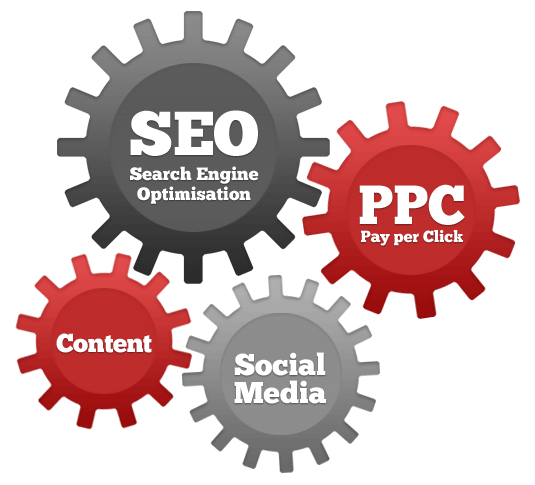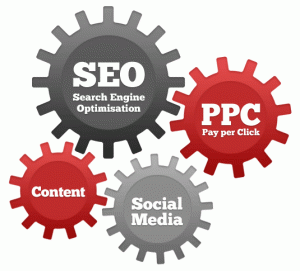
 Many SEO, PPC and Social Media teams work in isolation from each other with little or no integration between campaigns. Communication and coordination between the departments can be very poor if it happens at all.
Many SEO, PPC and Social Media teams work in isolation from each other with little or no integration between campaigns. Communication and coordination between the departments can be very poor if it happens at all.
This an unfortunate situation but it is a common one in brands and agencies alike. The lack of integration and coordination leads to inefficiency, missed opportunities and wasted money.
Digital marketers frequently cite the importance of integrating organic search, paid search and social media campaigns. But that advice has little value without specific, actionable tips.
Here is a simple checklist to help you make sure your strategies for SEO, PPC, social and content can all reap the benefits of basic integration:
1. Use PPC keyword conversion data for SEO targeting
PPC revenue data has never been more important to SEO, now that Google is hiding your organic keyword data behind “not provided”. Paid search campaigns can target a huge number of keywords, generating plenty of data to help identify which terms can generate the most money in organic search.
But the best SEO campaigns don’t just target the keywords generating the most PPC revenue. Digging deeper into the organic search data can reveal which keywords are most profitable and achievable. Good SEO campaigns focus on those keywords first.
2. Target expensive PPC keywords with SEO
If a keyword is costing a lot of money in your PPC campaigns then there is often a case for targeting it in SEO campaigns – particularly if the ROI from that keyword is not very strong in PPC. Expensive PPC keywords are often more competitive and difficult in SEO too – so you need to be patient and target quick-win keywords along the way.
But a stable organic ranking can persist for months or years, generating clicks and revenue indefinitely. Clearly in PPC you have to pay for each and every click: each time the money goes to Google and there is no future benefit.
3. Target difficult SEO keywords with PPC
Sometimes you have to accept that your website is never going to rank in the top 3 organic positions for a particular keyword. Or at least it would take a huge amount of time and investment to achieve that. Maybe you’re up against very strong pages on authority domains like the BBC, Wikipedia or Amazon. Maybe there are lots of good, natural inbound links pointing directly at the competing page too.
Once a keyword achieves a stable rank as high as it is ever likely to rank in organic search it makes no sense to invest a lot more effort in that keyword – although it may make sense to invest a little in maintaining the ranking. If you are unable to generate significant clicks and sales with organic search then PPC is a natural alternative. Of course, if a keyword fails to generate a worthwhile return on investment in either organic or paid search then your resources are better invested in other keywords and there are usually plenty.
4. Use social media for better outreach
Good bloggers get a lot of link building outreach emails. It is usually a waste of your time to send yet another one to their poor overworked inbox. Even if you are letting the blogger know about a site that you feel sure they would love to talk about, your email will probably be deleted along with a blizzard of other emails.
Start your outreach efforts by researching and engaging with the blogger. Read their blog, follow them on Twitter, retweet them, place a helpful comment on their Facebook page. Start to get their attention. When you are already engaged in a conversation on Facebook or Twitter (or indeed Google+) then the blogger is likely to be infinitely more receptive to your suggestion of a great page they might like to link to – or your offer of a fantastic piece of content for their blog. Just be human and helpful.
5. Use social campaigns to support link building
SEOs and Googlers often say that if you create a great piece of content people will naturally link to it – but that rarely happens in practice. Unless your site already has a large and vocal following then it’s unlikely that many bloggers and webmasters will happen to see your page, let alone link to it.
You need to seed and promote your content, targeting individuals and communities of people who your research suggests would likely to link to it. Usually if your content is properly tailored to your target market then it is also tailored for the people who influence them on social media such as bloggers and other commentators who have a strong social following. Creating good content and reaching out to potential link opportunities with proper social tactics can have benefits far beyond SEO and link building!
6. Use social channels to amplify SEO
Search engines mainly use links from other websites to identify the topic of a page and to measure its importance and trustworthiness. But as a result the web has seen widespread abuse in the form of manipulative, artificial link building – the sort of thing that has given SEO a bad name.
As you might expect, search engines seem to be seeking alternative ranking signals that they hope will be less open to manipulation. Google and Bing both say that they use data from Facebook and Google+ in their ranking algorithms and there can be little doubt that both search engines would prefer to use more social factors and less link-based ones. Google+ authorship may not yet have an impact on rankings but may well change and having authorship in place already delivers the benefit of your Google+ profile image appearing in search results. That alone could help improve your organic search Click Through Rate.
7. Use search content to support social campaigns
Call it what you wish: SEO, content marketing, inbound, social… The relatively small number of brands that are doing it right are creating good content that is designed to be really good for their target audience. They are placing that content on their website and usually elsewhere too. If you’re generating good content that is designed to help your SEO and PPC campaigns then why would you not use that same content to power your social campaigns?
If all of your content is too boring for social campaigns then maybe it’s not quite as useful as you thought it was for search campaigns. Your search customers – and the people who influence their decisions – are the very same people you are trying to engage through social media.
8. Use social content to support search campaigns
It also works the other way around. Content generated or aggregated mainly for your blog and social campaigns can support SEO and PPC campaigns too. Delivering a steady supply of fresh content brings search engines back to your site frequently so that, for example, they might index deep new product pages or changes more quickly.
For many search queries Google prefers to deliver fresh content – and this provides a wealth of opportunities to get your blog and social posts ranking for keywords that would otherwise be very difficult to rank for. Which brings me to my next point:
9. Use search data to create search-friendly social content
This is a key integration point between search and social! If you’re creating content for your website and social campaigns – but failing to optimise it for search campaigns – then you are not even beginning to integrate search and social. Without integration you will miss opportunities to generate substantial traffic and sales with organic and paid search. Do the keyword research, identify the keywords that work and then look for gaps in your existing content.
Your content should be designed for social sharing, with buttons to make it nice and easy to share. People who find your content using search engines may well share it with their friends too – providing you with additional marketing for free. Proper SEO and PPC keyword research can provide vital insights to help align your social, content and blogging strategies with SEO and PPC. But proper integration requires creative skills beyond the traditional SEO CV.
You need to delve deeply into the data and experienced practitioners develop a sixth sense for uncovering explosive content opportunities. That is just one example of the big opportunities provided by integrating search and social.
10. Use social data to harness emerging search demand
If you operate a website, you’re essentially a publisher—or at least you should be. Successful content has always been defined by timeliness and relevance, with the most impactful pieces riding the wave of topics that are taking off at the right moment. Social media monitoring and the daily insights of front-line staff are invaluable in spotting emerging trends as they begin to gain traction across the web. These observations, combined with sharp social campaigns, should uncover the memes, trends, and topics that matter most to your audience right now.
Take Peanut the Squirrel, for example. This quirky meme turned into a viral sensation, and the associated cryptocurrency, Pnut, followed suit. The Pnut crypto price skyrocketed by an astonishing 3000% in just one month. Moments like these show how seizing an opportunity early can lead to explosive outcomes. SEO, PPC, and social media give you the tools to act fast and produce content that taps into these surging interests.
Timing is everything. The moment you notice an emerging trend, the clock starts ticking. Aim to be among the first publishers to create and distribute relevant content. When timely content is shared socially, optimized for search, and added to your PPC campaigns, its impact can ripple far and wide. While “viral” is often an overused buzzword, it’s a real phenomenon. The Pnut story proves that when you strike at the right time, your content can fuel extraordinary growth.
The people
Getting your integrated digital strategy right is far from easy. It is all about the people.
SEO in particular is becoming extremely complex and challenging given Google’s efforts to make go away.
Given all the vital integration points between search, content and social and the sheer range of skills and tools you need, it is usually best to appoint a reputable digital agency – one that really gets integration and can demonstrate as much. Agencies can spread the substantial cost of the necessary tools and skills across their entire client base. I am proud to say that Digivate is one such agency and we would love to help you.
If you are serious about delivering better integration in-house then you face huge challenges. First you need to get serious about communication. Make sure everybody buys into improving collaboration and responsiveness. At the very least you need to hold regular cross-functional meetings to start breaking down the silo walls. Gathering people with a range of skills together to discuss content and targeting tactics on a regular basis is a very powerful thing that can generate an almost magical creative atmosphere.
Proper communication and collaboration are not just vital for effective marketing – they are the central nervous system of a successful business.



